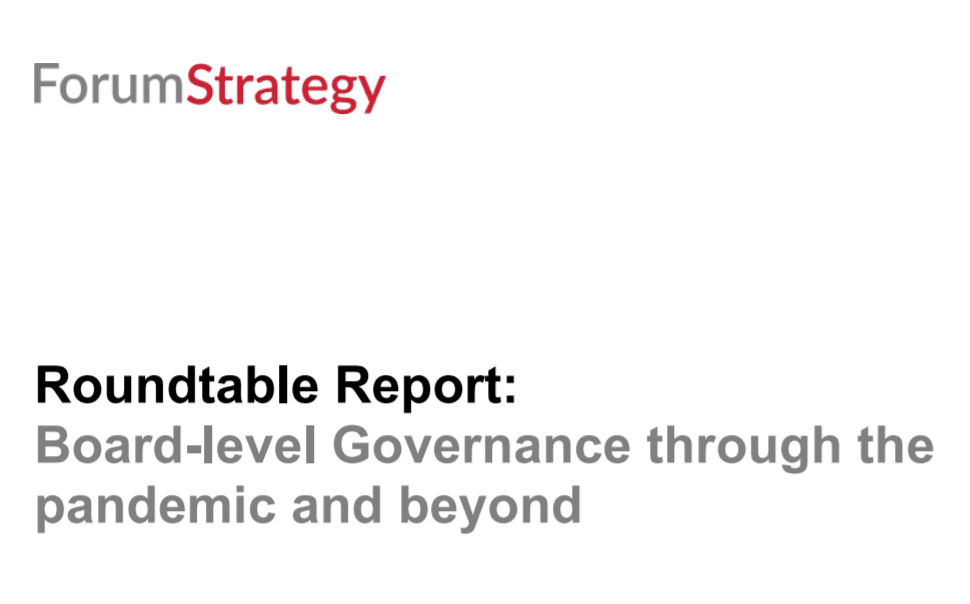This is a overview of our Roundtable Report shared with #TrustLeaders CEO and COO members on 11th January 2021.

Before Christmas, Forum Strategy brought together a number of academy trust Chairs of Trustees to reflect on how the pandemic had influenced their work and changed their approach. Despite the demands of recent months, it is clear that boards have learnt a lot about themselves, re-evaluated some of their priorities and relationships, and found some new and more efficient ways of operating. As we finally begin to emerge from the pandemic, it is clear that they will play a crucial role in shaping the new phase of education.
How has the work of boards changed in recent months?
Boards have had to swiftly adjust their priorities as they have reacted to the challenges of the pandemic. Much of the usual work that boards engage in, on medium to long term strategy for trusts, has had to be replaced by an immediate focus on ‘here and now’ issues. These have included overseeing the prioritisation of risk and compliance issues such as COVID specific health and safety assessments, and securing access to PPE.
Another challenge for boards has been considering how best to support CEOs and executive leaders. Board members have found themselves placing a greater emphasis on providing support, counsel and coaching for leaders as they navigate through these uncertain and demanding times. This has included protecting executive leaders – ensuring they are given permission and confidence to only focus on areas within their control in a wider context of significant change, noise and general anxiety in the system. It’s also involved being ready and available to listen to problems and concerns, reviewing risk assessments, supporting leaders to be prepared for major changes (including for remote learning), and being mindful of the wellbeing and workload challenges of all colleagues.
Board members have found themselves placing a greater emphasis on providing support, counsel and coaching for leaders as they navigate through these uncertain and demanding times.
Notably, there has been much less emphasis on national measures of accountability, as boards and trusts have focussed primarily on how best they can support and serve their local communities through this difficult period. Trustees generally saw this as an opportunity to create a more balanced approach to accountability as we emerge from the pandemic, ensuring that top down measures of success do not dominate in future, but are more readily complimented by and balanced with accountability to local communities and parents.
Despite ongoing issues, and how important it has been to react to the changing circumstances of the past year, it is once again time for boards to start looking ahead to the future, beyond the immediate issues of the pandemic. Boards now need to renew their focus on long-term strategy for their organisations, aligning that strategy to the challenges and opportunities that lie ahead in the medium to long term – including a changing employment market, a need to prioritise health and wellbeing, and the growing importance on environment sustainability.
What has changed regarding governance delivery?
The most obvious change has been the shift to online ‘remote governance’. This has brought with it some challenges (for example, access to appropriate technology, ensuring everyone can participate – relying on skilled chairing and facilitation, and concerns regarding the security of information – such as confidential information being overheard). These issues have largely been addressed as trust boards have begun to introduce a code of conduct for virtual meetings. The NGA has also published best practice guidance covering virtual meetings, monitoring and induction, which is available to their members.
trust boards have begun to introduce a code of conduct for virtual meetings.
Despite the challenges, the overall sense of colleagues was that, on balance, the move to remote governance has brought huge benefits. Virtual meetings open up the potential for recruitment of talented trustees from a wider area, and anecdotal evidence suggests virtual meetings have helped to improve diversity on trust boards due to reduced travel and time commitments.
However, Emma Knights (CEO of the NGA) has said that balance will be important moving forward, and that the NGA expects most boards will move to a mix of face-to-face and virtual meetings following the current pandemic. Since it is more difficult to build relationships when people cannot meet in person, face-to-face meetings should still play an important role in governance moving forward, especially at ‘core’ meetings such as board strategy days.
Looking ahead – what are boards identifying as their strategic priorities?
The emerging context, post-pandemic, will demand strategic leadership more than ever. The gap between disadvantaged pupils and their peers is growing once again, and more children and families are facing economic challenges. The wellbeing of staff and pupils is a growing concern, and there are also likely to be significant economic and social changes on the horizon. Considering what these issues mean for the development of the curriculum must be a key consideration as trust boards renew their vision and strategy in a post-COVID world.
There is also a real risk of an increase in early retirement among trust and school leaders due to the impact of the pandemic on their health and wellbeing. This must be addressed at the right time and in the right ways. Chairs of academy trusts should ensure they are having (tactful) conversations with leaders about their issues so they can be addressed in a timely manner, and so there is sufficient time to plan for leaders’ retirement or moving on (if necessary) with minimal disruption to the organisation. Leadership succession planning should be a key strategic focus for trust boards in response to these concerns.
Finally, in another shift accelerated by the pandemic, many trusts are beginning to look outwards, rather than upwards, when setting their measures of success, moving towards the kind of pure accountability described in Michael Pain’s article from summer 2020. More than ever trusts are recognising the power of community partnerships (beyond trusts and schools) and making themselves more accountable to their pupils, parents and staff. Trust boards have the power to give this type of accountability greater prominence in the coming months and years, especially as we know that ‘what gets measured gets done’.
Key learning points:
How has the work of boards changed in recent months?
- A greater focus on the ‘here and now’ as opposed to medium- to long-term thinking
- A greater onus on supporting and protecting executive leaders as appropriate
- Meetings less dominated by reference to national performance metrics and with greater reference to the views and experiences of communities – including parents
- Recognition that strategy and longer-term planning must return to the agenda
What has changed regarding governance delivery?
- Remote governance has become common place, with more boards adapting their code of conducts to reflect the risks
- Remote governance has brought benefits including reducing the time commitments placed on volunteers and widening the pool of prospective trustees
- Going forward, experts recommend a ‘blended approach’ so that boards maintain some of the advantages of remote governance, whilst not overlooking the importance of face to face working
Looking ahead – what are boards identifying as their strategic priorities?
- Despite understandably focusing on the here and now, the strategic role of boards is going to be critical in the months and years to come;
- Key strategic challenges will include the social and economic changes brought about or accelerated by COVID19, the importance of pupil and staff wellbeing, and retirement of experienced leaders;
- Boards will also play a key role in determining whether their organisations maintain a focus on looking outwards – to communities and parents – for accountability, not simply upwards to national, top down measures. This will define trusts in the medium – to longer term.

